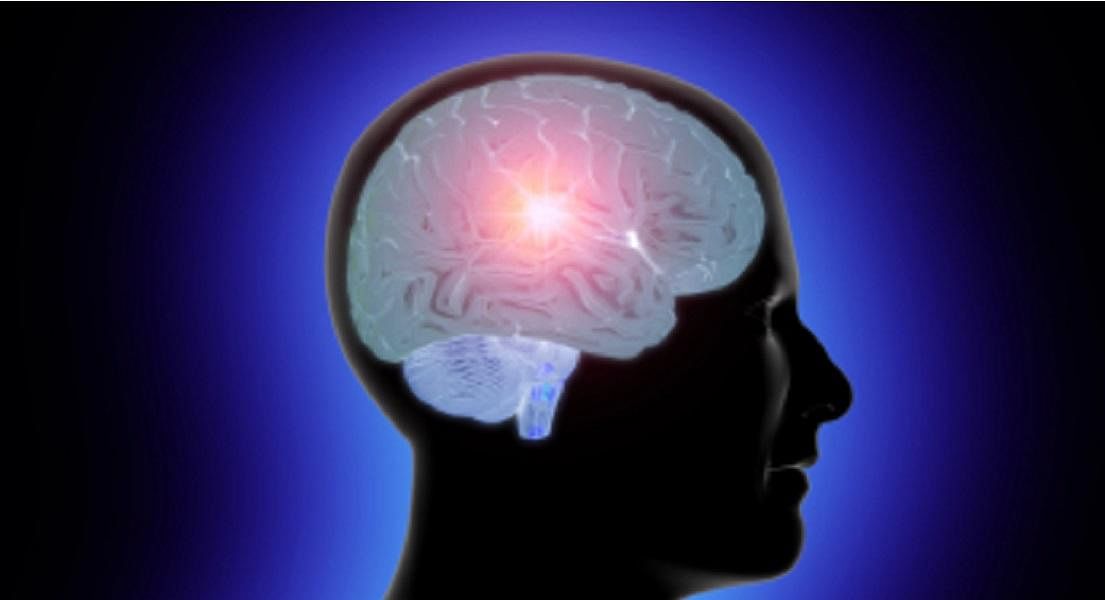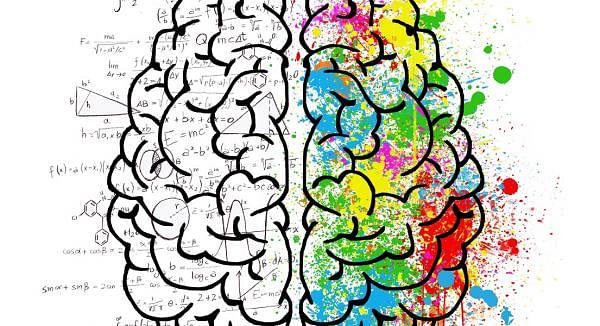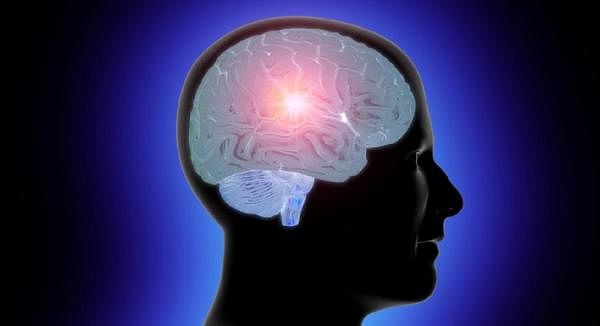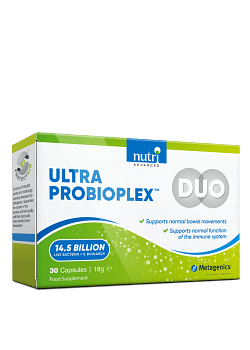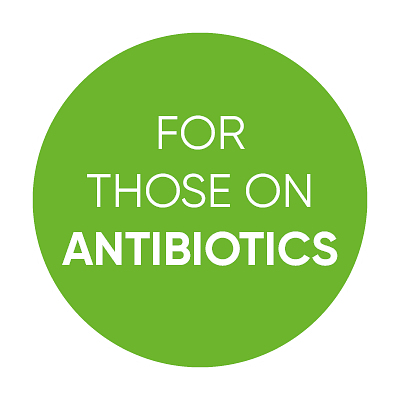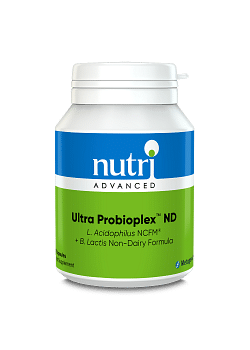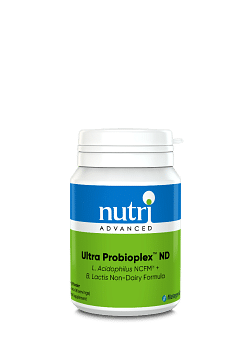The ‘Microbiota-Gut-Brain Axis'
Why you can trust Nutri Advanced Every article on our site is researched thoroughly by our team of highly qualified nutritionists. Find out more about our editorial process.
Research into the gut microbiome continues to accelerate forward at a rapid rate. And one area that has been particularly prolific is research into the influence of the gut microbiome on mental health.
Growing research now links the gut microbiome with the development and functioning of the central nervous system (CNS). The ‘microbiota-gut-brain axis’ is becoming an accepted term, and the way we think about mental health and how it is best supported in clinical practice is undergoing a significant paradigm shift.
The microbiota-gut-brain axis is a dynamic matrix of tissues and organs including the brain, glands, gastrointestinal system, immune cells and gut microbiome that communicate in a complex multi-faceted way to maintain homeostasis.
Currently, the strongest evidence to support the influence of the gut microbiome on mental health comes from animal studies that manipulate the composition and diversity of the gut microbiome. The development of the brain in the growing infant has also been shown to be influenced by the microbiome.1-4
In a 2011 study published in Gut Microbes, supplementation with probiotics improved symptoms of anxiety and depression in healthy human subjects. A later randomised, placebo-controlled trial involving 70 petrochemical workers found supplementation with probiotics to have beneficial effects on mental health parameters as assessed via general health questionnaire (GHQ) and depression and anxiety scores (DASS). Another 2015 study found that probiotics improved sad mood in healthy human volunteers.5-7
In a 2019 systematic review published in General Psychiatry, researchers investigated whether anxiety can be improved by regulation of intestinal microbiota. The systematic review included 21 studies involving 1503 subjects, and the researchers investigated both probiotic and non-probiotic methods of modulating the intestinal microbiota. The researchers concluded that more than half of the studies showed that regulating intestinal flora can effectively improve anxiety symptoms. They also noted that more research is needed to clarify this conclusion.8
There’s a long way to go before we can fully understand the complex relationship between the gut microbiome and mental health. One thing’s for sure though, given the masses of evidence now outlining just how crucial a healthy, diverse gut microbiome is for just about every aspect of health, it’s absolutely vital to be armed with clinical strategies to support this delicate ecosystem.
References:
1. Bravo JA, Forsythe P, Chew MV, Escaravage E, Savignac HM, Dinan TG, Bienenstock J, Cryan JF. (2011) Ingestion of Lactobacillus strain regulates emotional behavior and central GABA receptor expression in a mouse via the vagus nerve. Proc Natl Acad SciUSA 108:16050–16055.
2. Cryan JF, Kaupmann K. Don't worry 'B' happy!: a role for GABA(B) receptors in anxiety and depression.Trends Pharmacol Sci. 2005 Jan; 26 (1): 36-43
3. Borre YE, O’Keeffe GW, Clarke G, Stanton C, Dinan TG, Cryan JF. Microbiota and neurodevelopmental windows: Implications for brain disorders. Trends Mol. Med. 2014; 20(9): 509–518. 33.
4. Borre YE, Moloney RD, Clarke G, Dinan TG, Cryan JF. The impact of microbiota on brain and behavior: Mechanisms & therapeutic potential. Adv. Exp. Med. Biol. 2014; 817: 373–403.
5. Messaoudi M, Violle N, Bisson JF, Desor D, Javelot H, Rougeot C. 2011b) Beneficial psychological effects of a probiotic formulation (Lactobacillus helveticus R0052 and Bifidobacterium longum R0175) in healthy human volunteers. Gut Microbes 2:256–261.
6. Steenbergen L, Sellaro R, van Hemert S, Bosch JA, Colzato LS. (2015) A randomized controlled trial to test the effect of multispecies probiotics on cognitive reactivity to sad mood. Brain Behav Immun 48:258–264.
7. Mohammadi AA, Jazayeri S, Khosravi-Darani K, Solati Z, Mohammadpour N, Asemi Z, Adab Z, Djalali M, Tehrani-Doost M, Hosseini M, Eghtesadi S. (2015) The effects of probiotics on mental health and hypothalamic-pituitary-adrenal axis: a randomized, double-blind, placebo-controlled trial in petrochemical workers. Nutr Neurosci. Epub 16 Apr 2015.
8. Yang B, Wei J et al. Effects of regulating intestinal microbiota on anxiety symptoms: A systematic review. General Psychiatry Volume 32, Issue 2. 2019
This website and its content is copyright of Nutri Advanced ©. All rights reserved. See our terms & conditions for more detail.
Nutri Advanced has a thorough research process and for any references included, each source is scrutinised beforehand. We aim to use the highest value source where possible, referencing peer-reviewed journals and official guidelines in the first instance before alternatives. You can learn more about how we ensure our content is accurate at time of publication on our editorial policy.
Most Popular Articles
-
7 Surprising Ways To Support Your Magnesium
If you are displaying signs of a magnesium deficiency, here are 7 ways to boost your magnesium levels that are easy to incorporate into your daily life. -
5 Best Vitamin C Supplements Picked By Our Experts
Learn more about the different types of vitamin C, the different benefits you get from different types, and what you get for spending more on a good supplement. -
Top 5 Vitamins For Energy And Tiredness Picked By Our Experts
The 5 best and most important vitamins for energy & tiredness including B vitamin food sources & best supplement forms for energy. -
Benefits of Myo-Inositol for Polycystic Ovary Syndrome (PCOS)
In this research review article, we take a closer look at a lesser-known natural compound called myo-inositol that has been found to have significant potential to improve many of the prevalent features of PCOS. -
Top 10 Reasons to Give Your Kids Omega-3
Read the top 10 reasons that kids should have plenty of Omega-3- an essential fatty acid- including for depression, brain function, sleep & reading/maths skills.

